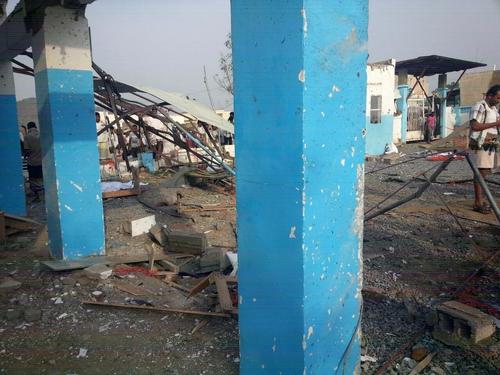
By Lizzie Dearden
At least 20 people were killed by shelling that hit a market in Taiz, where fighting has intensified between forces loyal to President Abed Rabbo Mansour Hadi and Houthi revolutionaries in recent weeks.
Destruction in Yemen
Another 27 people died in fighting as the government continued an offensive to recapture the presidential residence and police headquarters.
Médecins Sans Frontières [MSF] said 21 bodies had been taken to its clinics in Taiz on Thursday, including one of their own staff members. They also received 76 patients that had been wounded on both sides of the conflict.
Their injuries included burns, open wounds and lacerations.
Djoen Besselink, MSF’s head of mission in Yemen, said: "Sadly, one of our colleagues who works as watchman at the MSF trauma-center in Taiz was killed whilst he was off duty when a blast hit a local market in the neighborhood."
"Another heartbreaking example of a citizen affected by this ongoing conflict. We are deeply saddened by the loss of our colleague and extend our heartfelt condolences to his family and his friends."
He called the situation in Yemen "unacceptable" as government forces, Houthis, rebel militias, al-Qaeda and Isis continue to fight over pockets of control.
Almost a quarter of MSF’s patients in Taiz were civilian women and children with violence-related injuries last month.
An estimated 10,000 people have been killed since the start of the war in 2015, which has left millions more facing starvation amid shortages of food, water and medicine.
John Kerry, the US Secretary of State, announced a truce would come into effect on Thursday following an agreement between Houthi revolutionaries and the Saudi-led air coalition.
But the Hadi government swiftly rejected the proposed agreement and Saudi Arabia announced it would continue strikes in support of its ally.
The spokesperson for the Saudi-led coalition, Major General Ahmed Asiri, told AFP: "Until now there is no demand from the legitimate government [of Yemen] to observe a ceasefire.
"Consequently, the operations of the Yemeni army, supported by the coalition, will continue."
Fighting has continued across the country since the ceasefire was supposed to come into force, with seven fighters and five soldiers killed in clashes in Shabwa province on Thursday, as both parties fought for control of the oil-rich Usaylan region.
Meanwhile, planes from the Saudi-led coalition attacked Ansarullah positions in Saada, the northern stronghold of the Houthis, as well as in Nahm and Sarwah, close to the rebel-held capital Sana’a. Six other rebels were killed in an ambush in the central province of Baida, officials said.
Six attempts to secure a ceasefire in Yemen have failed, including a three-day truce in October that fell apart as soon as it went into force; the aim was to allow aid deliveries to millions of homeless and hungry Yemenis.
On Friday, the UN said it was working "very hard" with Saudi Arabia and other parties to bring Yemen’s government to peace talks.
Source: The Independent, Edited by Website Team